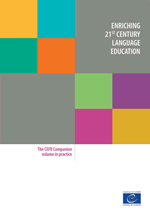Enriching 21st century language education - The CEFR Companion
volume in practice
 This volume of case studies will interest all those who aim to develop
language education in order to promote and support Europe’s rich linguistic
and cultural diversity, thus fostering a culture of democracy and social
justice in a time in which these values are increasingly under threat. This
situation calls for a new vision of language education in which the
development of mediation and plurilingual/pluricultural competence are
crucial.
This volume of case studies will interest all those who aim to develop
language education in order to promote and support Europe’s rich linguistic
and cultural diversity, thus fostering a culture of democracy and social
justice in a time in which these values are increasingly under threat. This
situation calls for a new vision of language education in which the
development of mediation and plurilingual/pluricultural competence are
crucial.
These case studies report on experience in a wide variety of contexts with the
concepts and descriptors of the Common European Framework of Reference for
Languages: Learning, teaching, assessment - Companion volume (CEFR Companion
volume), which broadens the vision of the CEFR 2001, enriching the CEFR model
in the areas of plurilingualism and mediation.
The studies report on classroom practice and awareness-raising activities from
all over Europe in secondary education, higher education, heritage language
education, pre-service teacher education and adult education. The authors
outline their experience in the language classroom and with stakeholders in
relation to mediation, appreciation of literature, plurilingualism, online
interaction and phonology.
The various chapters explore the relevance and usability of the new
descriptors for the implementation of an action-oriented approach to language
education, presenting the challenges and opportunities they encountered in the
process, and the reactions of their students and colleagues.
The series of case studies published in this volume have been selected from
over 30 that were carried out in the academic year 2018-19 as a follow-up to
the conference “CEFR Companion Volume: Language Education for Dynamic and
Inclusive Societies – Promoting Plurilingual and Pluricultural Education,”
which was held in Strasbourg in May 2018 to introduce the CEFR Companion
volume, published online in provisional form in English and French in February
2018.
Download pdf